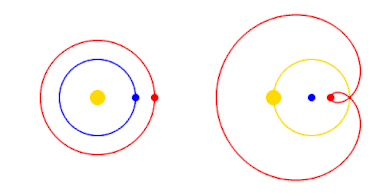The Kingdom of Ends

Kant stands at one of the great dividing points in the history of ethics. For perhaps the majority of later philosophical writers, including many who are self-consciously anti-Kantian, ethics is defined as a subject in Kantian terms. For many who have never heard of philosophy, let alone of Kant, morality is roughly what Kant said it was... But at the outset we have to note one very general point about Kant. He was in one sense both a typical and supreme representative of the Enlightenment; typical because of his belief in the power of courageous reasoning and in the effectiveness of the reform of institutions... supreme because in what he thought he either solved the recurrent problems of the Enlightenment or reformulated them in a much more fruitful way.
~Alasdair MacIntyre
Moral logic
Lets focus for a moment on the first five ethical theories we've covered: ethical egoism (EE), social contract theory (SCT), divine command theory (DCT), virtue ethics (VE), and cultural relativism (CR). These have been, more or less, presented in the order in which their root ideas came about. For example, theories in which human self-interest plays the dominant role, such as EE and Hobbes' SCT, were around since the beginning of the Western tradition, back in the time of Plato. As such, they were presented first. It should be said, however, that some of these theories are difficult to place on firm historical ground. Take for instance CR. We said last time that there were "hints" of a relativism far back in history, but the sort of relativism we're covering was only really conceived of in the 20th century. The same goes for DCT. There was a polytheistic version of DCT far back in history, at least since the time of Plato. But the DCT we're covering is not polytheistic—it's actually Catholic—and it is largely the sort of DCT that two figures from the Middle Ages would subscribe to. These figures are St. Thomas Aquinas and William of Ockham.1
The more important thing to note about the first five theories is that they all share a particular moral logic. Despite the fact that the ideas that gave birth to these theories are "smeared" across history, these are all originally forms of means-end reasoning (MacIntyre 2003, 2013). This is the point I made in Patterns of Culture when discussing moral discourses. Let me reiterate it here. Rather than focusing on specific ethical theories, it might be helpful to focus on moral discourses. From this perspective, the moral discourses covered thus far can be distinguished by the sort of justification given for moral rules and by the type of moral logic that they use (see Comments on historical recurrences from the Patterns of Culture). For example:
Social Contract Theory's moral logic:
if you want to avoid the condition of a war of all against all → give authority on moral/legal matters to a central powerThe Virtue Tradition's moral logic:
if you want to flourish in a particular social order → develop the virtues that are conducive to excellence in that social orderDivine Command Theory's moral logic:
if you want to avoid eternal damnation → follow the rules set forth by the deity
According to MacIntyre (2003, 2013), only a historical study of ethics allows you to realize this. This is because most ethicists today, as well as just regular folk, tend to use moral terms in a more absolutist sense. In other words, people tend to think of morality not as means-end reasoning (i.e., if you want this, then do this), but as something that must be done simply because it is the right thing to do. Again, this is not how most people in, say, Ancient Greece thought of morality. Interestingly enough, we can pinpoint when this shift in use of moral terms occurred. It has to do with the massively influential ethical theory we begin to cover today, one that transformed our way of conceiving of moral discourse itself. As it turns out (and as you read in the epigraph above), the way in which most people think about ethics today is the way that Immanuel Kant thought about ethics, Kant being the thinker whose theory we're beginning to cover today. But to understand his view, you have to understand his mind; and this mind was shaped by a revolution in thinking known as the Age of Enlightenment—a time period when the philosophy of humanism took hold.
The high water mark of religiosity
“In medieval Europe, the chief formula for knowledge was: knowledge = scriptures × logic. If we want to know the answer to some important question, we should read scriptures and use our logic to understand the exact meaning of the text… In practice, that meant that scholars sought knowledge by spending years in schools and libraries reading more and more texts and sharpening their logic so they could understand the texts correctly” (Harari 2017: 237-8).
Up until the dawn of Enlightenment era humanism, which began in the early 18th century, it was religion that gave meaning to every sphere of life. Although it doesn't always seem like it, the role of religion has been radically reduced since its high-water mark prior to the Enlightenment era. Religion gave meaning to art, music, science, war, and even death.2 Since it is hard to intuit this radical shift, I want to give you an example of the role that religion used to play in an institution that is still around today: punishment. Once you see how punishment used to be conceived of and compare that with how punishment is seen today, you'll have a better understanding of the radical shift that occurred. The following contains graphic descriptions of a kind of execution which was practiced in Kant's native Kingdom of Prussia, as well as throughout Western Europe, namely breaking on the wheel. Those who are sensitive can and should skip this video. For the rest, here is some Food for Thought...
Food for Thought
What humanism is

Fountain, by Marcel Duchamp.
As we've seen, before humanism, supernatural beings gave meaning and order to the cosmos. Now, humans do. In fact, this is one way to define humanism. In chapter 7 of Homo Deus, Yuval Noah Harari argues that humanism means that humans are the ultimate arbiter on meaning. To make his point, Harari discusses the radical shift of perspective and subject matter in art. It is no secret that religious expression used to dominate all art forms: paintings, music, etc. Now, however, what counts as art is a purely secular matter. In other words, it's ultimately up to humans. Consider the sculpture pictured right. Is it art? Really that’s for humans to debate and decide on. And this notion—that humans can give value to something merely by deciding that it has value—was inconceivable prior to humanism.
A further example can be how we characterize war. Before humanism, war was seen “from above.” The justification for armed conflict was divine, the soldiers were faceless, and the General was a genius. If one army defeated another, the General of the victorious army would claim that it was God's will that they won. (Otherwise, why would they have won?) This is why Genghis Khan called himself "the punishment of God". In this quote by the Great Khan, you can see how supernatural beliefs were imbued even into the reasons for why one group defeats another: "I am the punishment of God. If you had not committed great sins, God would not have sent a punishment like me upon you." Even the losers in war sought answers from the divine. When the Mongols captured Baghdad in 1258, religious leaders found themselves asking why their people had lost favor with Allah. (Why did Allah abandon them?) But now, after humanism, portrayals of war revolve around the individual soldier and their loss of innocence. Think of movies like Full Metal Jacket. We support the troops, not just the general. We critique our politicians if they send our young ones to die for no good reason. The perspective has clearly shifted.
It is, I think, impossible to put yourself into the mindframe of someone prior to humanism. But perhaps you can approximate thinking like someone who was in the transitional period. Perhaps you find meaning in the inquiries of science, as many did during this time period. Also during this time period there was a rise in literacy rates and the proliferation of non-religious literature, like novels (see Hunt 2007). If you find reading this kind of literature liberating, then you are approaching this way of thinking. In other words, you are approaching the worldview of Immanuel Kant.
Storytime!

The Capitol Hill Putsch,
6 January 2021.
We are almost ready to begin looking at Kant's worldview. There is one important difference between our perspective and his that needs to be discussed first: you have the benefit of hindsight. You know that Kant's time was a transitional period. At the time, however, loss of trust in traditional institutions must have been extremely concerning. Perhaps another way to look at it is this. Just like you are living through a transitional period—one where there is loss of trust in political institutions, one where there is uncertainty over the future of employment, one where the US is transitioning from being the global superpower to being second behind China—Kant was seeing the world around him in a state of crisis. When you think of Kant, you have to bring in this feeling of uncertainty into the picture. So, let's do a quick Storytime!, and then we'll be on our way...


Important Concepts
Human Understanding

The Copernican Revolution
(in perspective).
Prior to Kant's time, various thinkers had been trying to establish the foundations of the natural sciences. These are thinkers like Francis Bacon, René Descartes, John Locke, and Thomas Hobbes (see Footnote 2). Many found it unsatisfactory to justify science by saying simply that it works. As you might know, if all you know is that something works, but you don't know why it works, then you're going to be in a lot of trouble when it stops working. This is obviously because you'll have no idea how to fix it. And so thinkers were trying to establish the foundations of science for precisely this reason. But before even establishing these foundations, thinkers had to settle on a much more mundane question: Do we perceive the world as it actually is? Each thinker had their own position, but Kant was not satisfied with their theories. In Critique of Pure Reason, originally published in 1781, Kant engages in his Copernican revolution. Just like Copernicus' heliocentric theory takes into consideration that the Earth is simultaneously in its own orbit around the sun when explaining the movement of the other planets, Kant takes up the hypothesis that, when we perceive the objects in the world, our perceptual systems change them. In other words, Kant took into consideration how our cognitive systems give form to our perceptions, a form that isn't actually in the objects in the world.
This idea is profoundly modern. In his (1999) book The Number Sense, Dehaene gives an overview of the countless mathematicians who have wondered why mathematics is so apt for modeling the natural world. By this point, Dehaene has spent some 250 pages arguing that we actually have an innate module programmed into us by evolution that helps us visualize a number line and learn basic arithmetic concepts. And so Dehaene concludes that it is not the case that "mathematics is everywhere." Instead, we can't help but to see mathematics everywhere. Our brains project a mathematical understanding onto the world.
"There is one instrument on which scientists rely so regularly that they sometimes forget its very existence: their own brain. The brain is not a logical, universal, and optimal machine. While evolution has endowed it with a special sensitivity to certain parameters useful to science, such as number, it has also made it particularly restive and inefficient in logic and in long series of calculations. It has biased it, finally, to project onto physical phenomena an anthropocentric framework that causes all of us to see evidence for design where only evolution and randomness are at work. Is the universe really 'written in mathematical language,' as Galileo contended? I am inclined to think instead that this is the only language with which we can try to read it" (Dehaene 1999: 252).
In the Critique, Kant wants to study the limits of abstract thought; in other words, he wants to know what he can know through reason alone. Can we know nothing of value from pure reason? Or can we discover fundamental reality with it, as Plato thought? It would be impossible for me to summarize Kant's most important argument in this work, the transcendental deduction, but I can give you his main conclusion: it is through human understanding that the laws of nature come to be. In other words, human understanding is the true law-giver of nature; it is through our cognitive systems, with their built-in ways of looking at the world, that we "formalize" the world and project onto it the laws of nature, very close to what Dehaene said above.4
"Thus we ourselves bring into the appearances that order and regularity that we call nature, and moreover we would not be able to find it there if we, in the nature of our mind, had not originally put it there... The understanding is thus not merely a faculty for making rules through the comparison of the appearances; it is itself the legislation for nature, i.e. without understanding there would not be any nature at all" (Kant as quoted in Roecklein 2019: 108).


Human Reason
In case you haven't noticed, the preceding section was all devoted to human understanding. This section is devoted to human reason. For Kant, these are two different cognitive faculties. The basic distinction is as follows. Human understanding (through which we give order to the world, as seen in the previous section) contains forms of intuition, i.e., those built-in categories that shape the world when we cognize it. Human reason, on the other hand does not. Reason does not depend on the peculiarities of human cognition; what is reasonable is reasonable to all intelligent beings whether they be humans, angels, gods, or whatever.
Human understanding is the means by which we understand the world as it appears to us. Human reason, on the other hand, is the means by which we consider how the world ought to be. So both faculties help us construct the world, although in different senses of the word. And just as we give ourselves the laws of nature through human understanding, we give ourselves the moral law through human reason.
We should be more specific on the kinds of laws that human reason gives us. There are two ways that reason commands us. A hypothetical imperative is the sort of imperative (or command) where: a. you have a particular desired outcome or consequence, so b. you do a particular action as a means to that end. For example, “Billy wants to get an A in the course, so he does all the homework and engages in class.” Also, “Wendy is thirsty, so she got up to get some water.” Billy and Wendy had a desire, and reason came up with a rational means by which to fulfill said desire. That's one way that reason commands us.

A great white shark,
not known for vegetarianism.
A categorical imperative is a command from reason that applies across any situation no matter what you desire, i.e. it’s a set of rules you must follow, since they always apply. Put another way, there are some rules that if you don't obey, you'd be contradicting yourself.5 Kant believes that morality is a categorical imperative. It is a moral law that is commanded upon us by our own reason.
It is the realization that there is a moral law, and that we can fail to abide by it, that makes us realize that we are free.6 That means we are Rational Beings; we are beings that can live according to principles. Non-human animals can't do this. This is why it is funny to see vegetarian sharks in Finding Nemo: it's not in a shark's nature to be able to choose to be vegetarian. But we can choose the principles by which we live. Kant argues that this is what gives us moral personhood (i.e., the status of having moral rights).
“The starting point of Kant’s ethics is the concept of freedom. According to his famous maxim that ‘ought implies can’, the right action must always be possible: which is to say, I must always be free to perform it. The moral agent ‘judges that he can do certain things because he is conscious that he ought, and he recognises that he is free, a fact which, but for the moral law, he would have never known’”(Scruton 2001: 74).

Kant's Metaphysics
Some clarifications...
As previously stated, human understanding is for understanding the empirical realm (the world of phenomena that we perceive through our "forms of intuition"); human reason, then, helps us to come to know aspects of the transcendental realm (the realm of things-in-themselves), namely the general laws of logic that apply everywhere. Because Kant’s moral system is founded in this transcendental realm, along with the reasoning behind his defense of free will, he must rely solely on reason for making moral judgments, since only human reason can grasp the transcendental realm. This is why Kant argued that we can arrive at fundamental moral truths through reason alone (or Pure Reason); in other words, Kant was compelled to argue that we do not need to look at the consequences of the action (in the empirical realm) to see whether they are right or wrong given his views on metaphysics and the problem of free will. This is why Kant develops a purely duty- or rule-oriented view—consequences only operate in the realm of cause and effect, the empirical realm, but that's the domain of human understanding; moral truth can only be arrived at through human reason.
What is freedom for Kant? Kant stresses that freedom is not just doing whatever you desire. This is because some desires are not genuinely coming from us. Desires have either biological or social origins. For example, our desire for food and sex have biological origins. Other desires, like our desire to have a bigger following on Instagram, clearly has a social origin—and it has to do with sophisticated algorithms which design the user experience so as to be maximally addictive (see Lanier 2018).7 In any case, Kant argues that true freedom comes when you rid yourself of these non-rational desires. It is only when you allow yourself to be truly governed by reason that you are free. Getting rid of all your non-rational desires leads to pure practical reason. As previously mentioned, human reason is through which we give ourselves the moral law. So once you've gotten rid of these non-rational desires you can follow the moral law.
For the reasons outlined in the preceding paragraph, Kant argues that an action only has real moral worth (i.e. moral value) if it is done out of duty. Doing something out of duty is to do something because one is motivated out of respect for moral law, even if one doesn’t really want to do it. The moral worth of the act is derived not from the consequences of the act, but from the principle, or maxim, that motivated that act. For this reason, good will is the highest moral virtue. Good will is what allows you to follow the moral law. In fact, other virtues wouldn’t be as good without the possession of good will first. For example, being loyal is clearly a virtue. But if you are loyal to a tyrant, like Vlad the Impaler, you are doing many immoral things, like impaling people. If you have good will (towards others), you wouldn't be loyal to a tyrant like that. It is good will that allows loyalty to truly be a virtue.
We're finally ready to see Kant's ethical theory. The categorical imperative is...


To be continued...
FYI
Suggested Reading: Onora O’Neill, A Simplified Account of Kant’s Ethics
TL;DR: Crash Course, Kant & Categorical Imperatives
Supplementary Material—
- Reading: Tim Jankowiak, IEP Entry to Immanuel Kant, Section on Moral Theory
Advanced Material—
-
Reading: Christine Korsgaard, Kant's Formula of Universal Law
-
Reading: Michael Rohlf, Stanford Encyclopedia of Philosophy Entry to Immanuel Kant
-
Book: Immanuel Kant, Critique of Pure Reason
Footnotes
1. St. Thomas Aquinas and William of Ockham did both believe in divine comamnd theory, but, in other respects, they are really more like each other's archnemesis. Their debates can't be covered here. For a brief survey of their debates, you can take my PHIL 101 course. For a more complete analysis, you can take PHIL 107: Philosophy of Religion or PHIL 111: History of Ancient and Medieval Philosophy.
2. Some students sometimes ask how religion motivated scientific inquiry. As it turns out, the very same scientists who played a role in the downfall of Aristotelianism and the ushering in of the new Newtonian worldview in the 17th century were motivated by religious fervor. Copernicus was motivated by neo-Platonism, a sort of Christian version of Plato's philosophy (DeWitt 2018: 121-123), and Kepler developed his system, which was actually correct, through his attempts to "read the mind of God" (ibid., 131-136). Even Galileo was a devout Catholic; he just had a different interpretation of scripture than did Catholic authorities; the interested student can read Galileo's Letter to Castelli, where he most clearly articulates his views on the matter. Interestingly enough, the only thinker from this period that seemed to have advocated a genuinely secular worldview was none other than Thomas Hobbes. “It should be said, however, that Hobbes (despite his own pleas) has rarely been seen as the key theoretician of modern science—which illustrates the dubiousness of the notion that were was a historical link between modern science and the process of secularization. Scientists in the 17th and 18th centuries in fact disowned the one true secular philosophy of science on offer to them [i.e., that of Hobbes], preferring instead the elaborate theological speculations in which Newton indulged” (Tuck 2002: 60).
3. Sure, there are still people who are profoundly religious. But since humanism came about, even the profoundly religious often don't find meaning exclusively in the religious sphere.
4. Although it is not directly relevant to the course, the "forms of intuition" that Kant argued are a part of how we see the world but not a part of the world in-and-of-itself are actually space and time. In other words, Kant believed space and time are not actually features of the world but added to our sensory impressions of the world when we cognize it. Believe it or not, some physicists believe Kant is actually right: spacetime isn't objectively real, we construct it through our perceptual systems (see Rovelli 2018).
5. For example, here are some commands from reason: a. You may not conceive of a married bachelor; b. You may not conceive of a round square.
6. Roger Scruton puts it this way: “The law of cause and effect operates only in the realm of nature (the empirical realm). Freedom, however, belongs, not to nature, but precisely to that ‘intelligible’ or transcendental realm to which categories like causality do not apply” (Scruton 2001: 75).
7. I suppose that, in addition to Lanier's Ten arguments for deleting your social media accounts right now, I'd also recommend Netflix's The Social Dilemma. However, I should add that the dramatizations in this Netflix documentary are somewhat misleading and hyperbolic. In the case of the algorithms powering social media and the profit model behind it, it is scary enough to just describe these as they are without resorting to hyperbole. I suppose, though, that the dramatizations are necessary to convey the message without getting bogged down in technical details.

